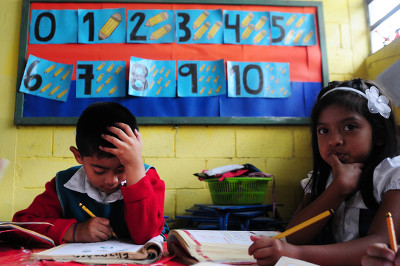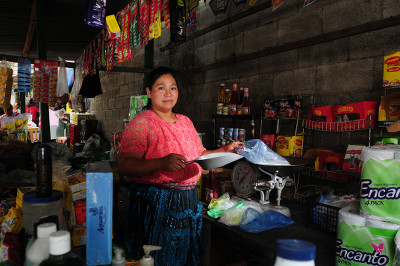The Beijing Declaration and Platform for Action in Latin America and the Caribbean: Three impacts on taxation and redistribution of the economic situation of women.
Date:
Almost 20 years ago, the world met in Beijing at the Fourth World Conference on Women. There, 189 governments adopted an innovative roadmap for gender equality: the Beijing Declaration and Platform for Action. About 17,000 participants and 30,000 activists envisioned a world in which women and girls have equal rights, freedom and opportunities in all areas of life.

A boy and a girl in their classroom in El Renacimiento school, in Villa Nueva, Guatemala. Photo: Maria Fleischmann / World Bank
Despite all the progress made in the last two decades, no country can claim to have achieved equality between men and women, especially in regards to economic empowerment of women, one of the pillars for the prevention of violence and development of leadership.

A woman attends her post in a market in zone 3, Guatemala City. Guatemala. Photo: Maria Fleischmann / World Bank
In Latin America and the Caribbean, much remains to be done. In the past 20 years, the average rate of participation of women in the labor force grew by only 11 percentage points between 1990 and 2010 according to figures from the United Nations Economic Commission for Latin America and the Caribbean (ECLAC), and in 2012 was just over 50% on average. Women make up only 49% of the total employed labor force and disproportionately 51% of all unemployed persons (who are unemployed and looking for a job).
Most of these working women (up to 54%) do so in the informal sector of the economy and, within the informal sector, in occupations that are less profitable. The wage gap between men and women in Latin America reaches 17%: regardless of the level of education, age or type of employment, women earn less than men for work of equal value. Additionally, 7 in 10 women work in the service industry or commerce that have lower productivity, wages and levels of social protection. The impact on government finances of these gaps is obvious.
On the other hand, some governments in the region are using or are considering using the income tax as a tool to reduce informality. However, the absence of a rigorous analysis of how to reduce informality among women may end up costing several million to the public coffers.
The sector of paid domestic work is the most important occupation for women in Latin America from the numerical point of view: 14 out of 100 working women are in this sector. Despite advances in its protection as workers, there is still resistance in several countries to ratify Convention 189 of the International Labour Organization (ILO) which protects their rights and makes them contributors to social security systems. Their work is vital in the absence of quality public services to care for dependents (children and elderly).
Additionally, 1 in 3 women in the region, according to ECLAC, does not generate her own income, compared with 11.7% of men, which has consequences throughout the life cycle of women and has a negative impact on social spending. On the one hand they are not contributing to social security systems or drop out at some point because of family responsibilities. On the other hand, the tendency showing an increasing number of households headed by women, together with the aging of our societies, clearly indicates that both fiscal and social policies must complement and adapt to these new realities, recognizing the work of unpaid social reproduction carried out largely by women. This, so far, has been integrated only in a few countries with the expansion of social protection floors in our region.
Also, women in our region work approximately 14-30 hours more per week than men, if we take into account unpaid work, for instance, caring for the family.
It is estimated that 90% of all domestic unpaid care is provided by women, representing around 30% to 50% of GDP, according to various calculations performed worldwide by the Organization for Economic Co-operation and Development (OECD). Any financial or tax changes that affect the use of time in households has a direct impact on the decisions of households and particularly on women. Furthermore, as concluded by the report of the Special Rapporteur on extreme poverty and human rights, States cannot ignore the unequal care responsibilities as this directly limits the equal enjoyment by women of human rights and influences over their poverty status. This report calls on States to facilitate, finance, support and regulate such work to avoid violating its obligations on human rights.
Fiscal policies can and should also aim at reducing inequalities between men and women. As a fundamental instrument of income redistribution, the Beijing Platform for Action sends a clear signal to the public about the intentions of the State as guarantor of equal opportunities for all. Stimulating fiscal policies with incentives adjusted to the realities of women to get them out of the informality and incentives for companies to introduce co-responsibility for the care of dependents, as well as for hiring women in sectors and non-traditional occupations, added to a fairer tax collection, will undoubtedly contribute to the States’ fulfillment of their commitments made 20 years ago.
By Elizabeth Villagómez, Regional Advisor for Economic Empowerment of Women, UN Women for the Americas and the Caribbean.